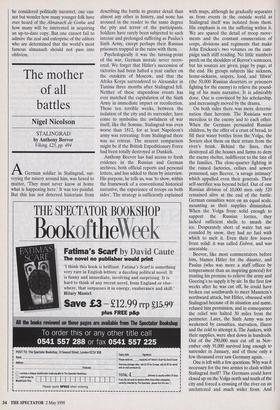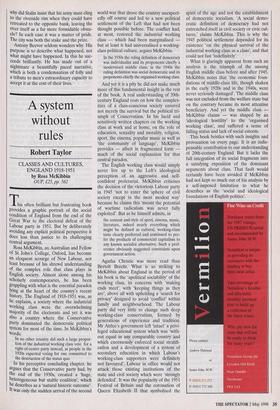The mother of all battles
Nigel Nicolson
STALINGRAD by Anthony Beevor Viking, £25, pp. 494 AGerman soldier in Stalingrad, sur- veying the misery around him, was heard to mutter, They must never know at home what is happening here.' It was too painful. But this has not deterred historians from describing the battle in greater detail than almost any other in history, and none has aroused in the reader to the same degree the pity and terror of the participants. Soldiers have rarely been subjected to such intense and prolonged suffering as Paulus's Sixth Army, except perhaps their Russian prisoners trapped in the ruins with them.
Psychologically it was the turning-point of the war. German morale never recov- ered. We forget that Hitler's succession of victories had been halted a year earlier on the outskirts of Moscow, and that the Afrika Korps surrendered to Alexander in Tunisia three months after Stalingrad fell. Neither of these stupendous events has ever matched the capitulation of the Sixth Army in immediate impact or recollection. Those ten terrible weeks, between the isolation of the city and its surrender, have come to symbolise the awfulness of war itself, like the Somme. Stalingrad was even worse than 1812, for at least Napoleon's army was retreating: from Stalingrad there was no retreat. The nearest comparison might be if the British Expeditionary Force had been totally destroyed at Dunkirk.
Anthony Beevor has had access to fresh evidence in the Russian and German archives, both official reports and personal letters, and has added to them by interview. His purpose, he tells us, was 'to show, within the framework of a conventional historical narrative, the experience of troops on both sides'. The strategy is sufficiently explained with maps, although he gradually separates us from events in the outside world as Stalingrad itself was isolated from them. His emphasis is on the suffering within it. We are spared the detail of troop move- ments and the constant enumeration of corps, divisions and regiments that make John Erickson's two volumes on the cam- paign such stiff reading. No little numbers perch on the shoulders of Beevor's sentences, but his sources are given, page by page, at the end. He groups subjects like sickness, home-sickness, snipers, food, and (the 50,000 Russian deserters or prisoners fighting for the enemy) to relieve,the pound- ing of his main narrative. It is admirably done. One is convinced by his scholarship, and increasingly moved by the drama.
On both sides there was more determi- nation than heroism. The Russians were merciless to the enemy and to ach other. When the Germans persuad d Russian children, by the offer of a crust f bread, to fill their water bottles from the Volga, the Soviets shot them on their return from the river's brink. Behind the lines, they destroyed all the houses and farms to deny the enemy shelter, indifferent to the fate of the families. The close-quarter fighting in the ruined factories, cellars and sewers possessed, says Beevor, 'a savage intimacy' which appalled even their generals. Their self-sacrifice was beyond belief. Out of one Russian division of 10,000 men only 320 remained alive at the end of the battle. German casualties were on an equal scale, mounting as their supplies diminished. When the Volga froze solid enough to support the Russian lorries, they lacked sufficient shells to smash the ice. Desperately short of water but sur- rounded by snow, they had no fuel with which to melt it. Even their few loaves froze solid: it was called Eisbrot, and was uneatable.
Beevor, like most commentators before him, blames Hitler for the disaster, and Paulus (who was more a staff officer by temperament than an inspiring general) for trusting his promise to relieve the army and Goering's to supply it by air. In the first few weeks after he was cut off, he could have broken out southwards to meet Manstein's northward attack, but Hitler, obsessed with Stalingrad because of its situation and name, refused him permission, and in consequence the relief was halted 30 miles from the perimeter. Later, the Sixth Army was too weakened by casualties, starvation, illness and the cold to attempt it. The Junkers, with their supplies, were shot down in hundreds. Out of the 290,000 men cut off in Nov- ember only 91,000 survived long enough to surrender in January, and of those only a few thousand ever saw Germany again.
One is left with a few questions. Why was it necessary for the two armies to clash within Stalingrad itself? The Germans could have closed up on the Volga north and south of the city and forced a crossing of the river on an uncluttered and much wider front, And why did Stalin insist that his army must cling to the riverside rim when they could have retreated to the opposite bank, leaving the river itself as a far more formidable obsta- cle? In each case it was a matter of pride. The city was both the stake and the prize.
Antony Beevor seldom wonders why. His Purpose is to describe what happened, not what might have happened. In this he suc- ceeds brilliantly. He has made out of a nightmare a beautifully paced narrative, which is both a condemnation of folly and a tribute to men's extraordinary capacity to accept it at the cost of their lives.



























































 Previous page
Previous page